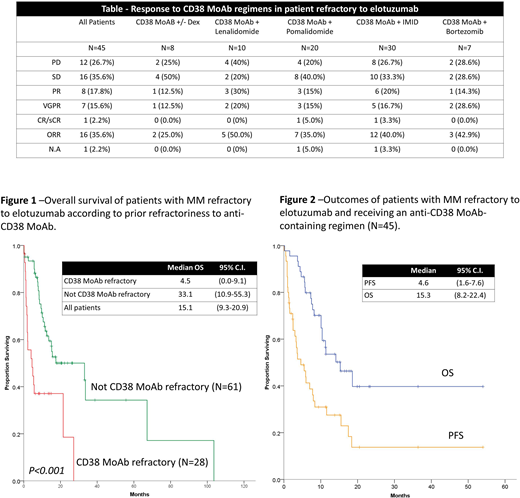Abstract
Introduction:
Monoclonal antibodies (MoAbs) have shown activity in relapsed and refractory multiple myeloma (MM). Elotuzumab is an anti-SLAMF7 MoAb that synergizes with immunomodulatory agents (IMiDs) and is approved for treatment of relapsed and refractory MM. Anti-CD38 MoAbs (daratumumab, FDA approved and isatuximab, in clinical trials) have also entered the therapeutic MM landscape but little is known about how to best sequence MoAbs and the existence of cross resistance between different classes of MoAbs. We analyzed outcomes of patients who become refractory to elotuzumab with emphasis on the activity of anti-CD38 MoAbs in the post-elotuzumab setting.
Methods:
We identified patients from 14 academic institutions within the US who were refractory to elotuzumab administered alone or in combination with other agents. Patients were considered refractory to elotuzumab if treated with at least 4 weeks of therapy and had evidence of progressive disease (PD) within 60 days of last dose. Time zero (T0) was defined as point when myeloma became refractory to elotuzumab-containing regimen. Data were collected with an electronic platform and submitted to peer-based quality check for completeness and internal consistency. We analyzed demographics, characteristics of their myeloma and prior therapy including number and type of therapy prior to elotuzumab, duration of elotuzumab therapy, and outcome after becoming refractory to elotuzumab. We performed a multi-variable analysis of these factors to determine significant factors associated with survival post T0. We subsequently identified a subset of patients who received an anti-CD38 MoAb alone or in combination as next or subsequent line of therapy after T0 and report their outcomes.
Results:
Eighty-nine patients were evaluated. Eighty-six (96.6%) had progression on elotuzumab in combination with IMiD (N=82) or another agent (N=4). Median age at T0 was 65 years (range 28-90), 51% of patients were males, 65% were White, 54% had IgG subtype, 27% had ISS stage III at diagnosis, and 27% had high-risk cytogenetics. Patients received a median of 4 prior lines of treatment (range 1-11) prior to elotuzumab-containing regimen, including 66% who underwent autologous transplant. Sixty-one patients (69%) were refractory to at least one IMiD and one proteasome inhibitor (PI) at T0, classified as double-refractory. Twenty-one (23.6%) were quad-refractory, i.e. refractory to 2 IMiDs and 2 PIs. Twenty-eight patients (31.5%) were refractory to prior anti-CD38 MoAb. The median time from diagnosis to T0 was 59.5 months and duration of elotuzumab therapy was 3 months (range 0.4 - 59.5). Median OS from T0 for the entire cohort was 15.1 months (95% C.I. 9.3-20.9). In multivariate analysis, the only factors affecting OS after T0 were high-risk cytogenetics (HR 3.31, 95% C.I. 1.74-6.27, P<0.001) and refractoriness to prior anti-CD38 MoAb (HR 4.22, 95% C.I. 2.22-8.01, P<0.001). Interestingly, median OS for patients not refractory to anti-CD38 MoAb was 33.1 months vs. 4.5 months for anti-CD38 MoAb-refractory patients (Figure 1). After T0, 45 patients (50.6%) received an anti-CD38 MoAb in the next (N=28, 62.5%) or subsequent regimens (N=17, 37.8%). Median time between T0 and initiation of anti-CD38 MoAb was 1.2 months (0-15.0). Anti-CD38 MoAbs employed were: isatuximab in 4 (8.9%) and daratumumab in 41 patients (91.1%). In most cases, the anti-CD38 MoAb was administered in combination with IMiD (N=30, 66.6%) or bortezomib (N=7, 15.6%). The overall response rate (ORR) for anti-CD38 MoAb regimens was 35.6%; responses to specific combinations are outlined in the Table. Median PFS for elotuzumab-refractory patients receiving therapy with anti-CD38 MoAbs was 4.6 months (95% C.I. 1.6-7.6), while median OS was 15.3 months (95% C.I. 8.2-22.4) (Figure 2).
Conclusion:
Patient who become refractory to elotuzumab have guarded prognosis, particularly dismal among patients also refractory to anti-CD38 MoAb, defining a population with great need for novel therapies. Failure of elotuzumab-based therapy does not preclude disease control with anti-CD38 MoAb, particularly in combination.
Paul:Bristol Myer Squibb: Other: Stock and pension plan (past employee). Amarendra:Amgen: Consultancy; Celgene: Consultancy. Liedtke:Caelum: Membership on an entity's Board of Directors or advisory committees; celgene: Research Funding; Takeda: Membership on an entity's Board of Directors or advisory committees, Research Funding; Genentech/Roche: Research Funding; BlueBirdBio: Research Funding; Prothena: Honoraria, Membership on an entity's Board of Directors or advisory committees, Research Funding; Pfizer: Honoraria, Membership on an entity's Board of Directors or advisory committees, Research Funding; Amgen/Onyx: Consultancy, Honoraria, Research Funding; Gilead: Membership on an entity's Board of Directors or advisory committees, Research Funding. Hari:Kite Pharma: Consultancy, Honoraria; Celgene: Consultancy, Honoraria, Research Funding; Takeda: Consultancy, Honoraria, Research Funding; Sanofi: Honoraria, Research Funding; Janssen: Honoraria; Bristol-Myers Squibb: Consultancy, Research Funding; Amgen Inc.: Research Funding; Spectrum: Consultancy, Research Funding. Vij:Karyopharm: Honoraria; Jazz Pharmaceuticals: Honoraria; Janssen: Honoraria; Amgen: Honoraria; Takeda: Honoraria, Research Funding; Bristol Myer Squibb: Honoraria, Research Funding; Celgene: Honoraria, Research Funding. Usmani:Abbvie, Amgen, Celgene, Genmab, Merck, MundiPharma, Janssen, Seattle Genetics: Consultancy; Amgen, BMS, Celgene, Janssen, Merck, Pharmacyclics,Sanofi, Seattle Genetics, Takeda: Research Funding. Kumar:Celgene: Membership on an entity's Board of Directors or advisory committees, Research Funding; KITE: Membership on an entity's Board of Directors or advisory committees, Research Funding; Janssen: Membership on an entity's Board of Directors or advisory committees, Research Funding; AbbVie: Membership on an entity's Board of Directors or advisory committees, Research Funding. Costa:Karyopharm: Research Funding; Abbvie: Research Funding; Amgen: Honoraria, Research Funding; Celgene: Honoraria, Research Funding; BMS: Research Funding; Sanofi: Honoraria; Janssen: Research Funding.
Author notes
Asterisk with author names denotes non-ASH members.


This feature is available to Subscribers Only
Sign In or Create an Account Close Modal